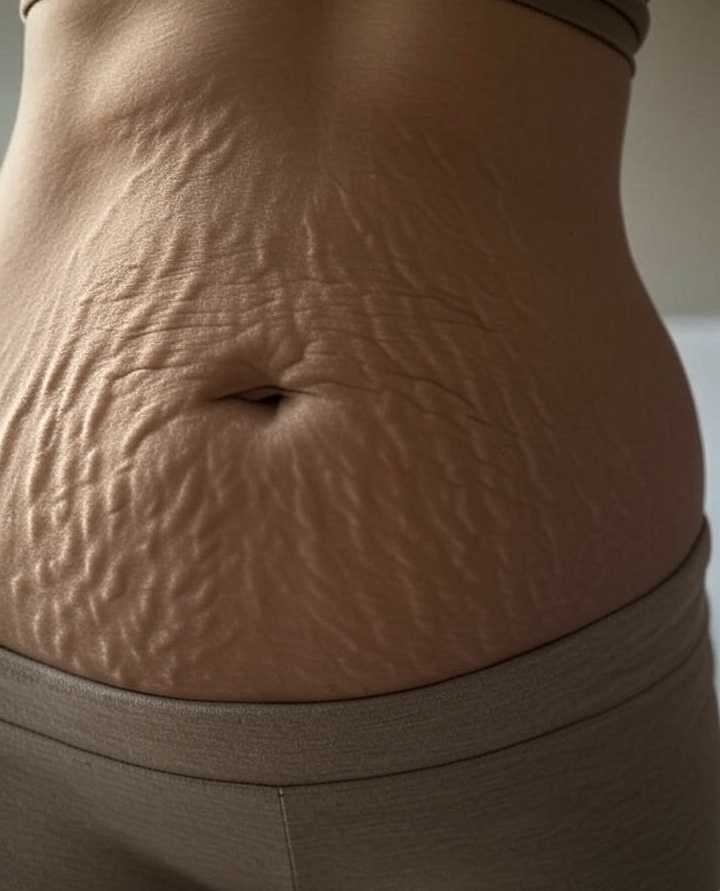Stretch marks, we all hate them. But do you know any stretch marks removal methods? Or do you actually remove stretch marks easily? And did you know the most common method similarly used to get rid of stretch marks actually never works?
So in this particular guide, we’ll be sharing with you why you have stretch marks, who are actually more prone to stretch marks, the myth around treating stretch marks, and the actual treatments that yield proper results when you apply it on your stretch marks.
So how do you actually get rid of stretch marks? We’ll be sharing with you why applying a common product on your stretch mark doesn’t work to reduce it, and the actual creams and treatments that you can do to reduce and remove your stretch marks.
Stretch Marks Removal Methods
What are Stretch Marks and why they Occur
Stretch mark is a model or a cross-section of our skin, and what we have here is two different layers.
The top layer here is called the epidermal layer or epidermis, which you see throughout your body, and what you do not see is the dermis or the dermal layer.
Now, this particular layer is thicker than the epidermis, and it actually holds very important structures which are important for your skin’s health.

So among the skin structures in the dermis are things like nerves, blood vessels, but more importantly, things like collagen and elastin.
Collagen and elastin are fibers which are able to stretch and contract at will. However, the issue with collagen and elastin is when you overstretch them, they tend to break, and when they break, they do not actually heal properly.
So when you have a sudden increase or stretchability of your skin, that’s when stretch marks occur, and they typically occur in a few conditions whereby your skin suddenly stretches over a short period of time.
For example, pregnancy, puberty, when you’re undergoing massive weight gain in a short period of time.
It also occurs in bodybuilders whereby their muscles hypertrophy or grow in size in a short period of time. And also in certain hormone conditions like Cushing’s syndrome whereby not only does the weight balloon up, but the collagen structures weaken due to hormonal changes.
And there are some people, unfortunately, are just genetics and it just occurs to them. When your collagen stretches and it breaks, typically the next thing is the healing process.
As your stretch marks heal, they typically come in a couple of different colors. It could be red, it could be purple, or it could be very dark discoloration. However, over time, they all become hypopigmented, becomes white.
And the more intense the tear and the deeper the collagen is, the bigger the stretch marks become.
Will Stretch Marks Go Away?
So can you actually get rid of stretch marks? Well, the answer is yes and no. It really depends on a couple of factors.
Factor number one is, at what age do you get the stretch marks? The more recent the stretch marks, the easier the marks disappear.
But if your stretch marks occur many, many years ago, it might be difficult to actually get rid of them. It also depends on the area of your body.
Typically areas like the abdomen and the thighs takes more time for it to disappear compared to the stretch marks on the upper bodies.
And last one is consistency of your treatment. The more consistent your treatment becomes, the quicker it disappears.
Treatment To Get Out Of Stretch Marks
So let’s talk about the treatments for stretch marks. Now we are going to share with you a treatment that actually doesn’t work for stretch marks. However, a lot of people on the internet do it, and a lot of doctors also get it wrong.
Applying cream or emollients like cocoa butter, coconut oil, or any sort of essential oil or fruit oil or seed oil on your skin does not actually prevent stretch marks.
That is because when you apply the oil on the top layer of your skin, they are typically not absorbed by the epidermis layer. That means that whatever you’ve applied just sits on top and doesn’t reach its affected area, which is the deep dermal area.
So if someone were to share with you that applying a certain cream or butter on your skin actually reduces or prevents stretch marks, that is a total bull and it’s total myth.
However, here are four proven methods to reduce your stretch marks.
Retinoid, aka Adapalene or Tretinoin
The first is to apply a retinoid, aka adapalene or tretinoin, on your stretch marks every day.
Tretinoin or adapalene is typically used for acne treatments and lately used for anti-aging treatments because it triggers collagen growth.
So when you apply on your stretch marks, you are actually triggering more collagen growth at the areas around the stretch marks than in the stretch marks. So the more healthier collagen you have, the lesser the appearance of your stretch marks.
The recommendation is if you have never tried it before, use it just once a week, then slowly increase the frequency to twice a week and up to every day.
Fractional Lasers
Secondly, while applying your retinoid, you could actually go for fractional lasers. Fractionated lasers like CO2 lasers uses heat to break up the unhealthy and the ugly stretch marks, so the new collagen could weave in between the stretch marks and then your stretch marks actually get lesser.
Fractional Radiofrequency
But now there’s a third treatment that actually is proven to work better than fractional CO2 laser, which are fractional radiofrequency. Now this treatment is where there are small tiny pins and needles that goes under the epidermal layer and a radiofrequency pulse is emitted, which destroys old stretch mark scars and triggers new collagen growth.
Experimental Treatment known as PRP or Platelet-rich Plasma
Typically used for the phase IV anti-aging, it does have limited results when injected over the areas with stretch marks and it works best if you couple it together with a fractionated radiofrequency or CO2 laser and daily application of your retinoid.
Conclusion
Stretch marks are actually normal and almost everyone has them, people from athletes, supermodels and even doctors ourselves. And using modern techniques, you could actually reduce the appearance of your stretch marks or even up to a point, even get rid of them.


